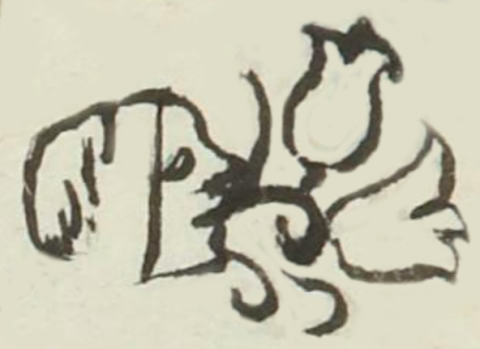Xochitlatoa (MH874r)
This black-line drawing of the compound glyph for the personal name Xochitlatoa (or Xochitlahtoa, when including the glottal stop), perhaps meaning "He Speaks Flowers," shows the head of a man in profile, looking toward the viewer’s right. He has a line down the side of his head, perhaps representing face paint or a tattoo. Several speech scrolls or volutes come out of his mouth, and attached to them on the far right side are two flowers. These flowers have three visible petals each.
Stephanie Wood
This is a very popular name, still found in Mexico today, especially the state of Puebla. Flowery speech is a known form of speech. In contemporary Nahuatl, one with flowery speech is a poet. [See: Delfino Hernández Hernández, “Xochitlajtouani: El Poeta,” in Yancuic Nahua Zazanilli: Nueva Narrativa, Mexico City: Universidad Nacional Autónoma de México, Instituto de Investigaciones Históricas, 1985.] Pamela Sandstrom says of flowery speech: "We do know that poetic, well-arranged words in the Nahuatl language were believed to be exceptionally powerful tools for addressing deities and setting things right. Flowery speech coupled with ritual action were the most effective means the Aztecs possessed to keep the forces of chaos at bay." [See her answer to a question published by Mexicolore in 2021.]
Stephanie Wood
miguel xochitlatoa
Miguel Xochitlatoa
Stephanie Wood
1560
Jeff Haskett-Wood
flores, hablar, nombres de hombres

xochi(tl), flowers, https://nahuatl.wired-humanities.org/content/xochitl
tlatoa, to speak, https://nahuatl.wired-humanities.org/content/tlatoa
posiblemente, ´El Habla en Flores
Stephanie Wood
Matrícula de Huexotzinco, folio 874r, World Digital Library, https://www.loc.gov/resource/gdcwdl.wdl_15282/?sp=820&st=image.
This manuscript is hosted by the Library of Congress and the World Digital Library; used here with the Creative Commons, “Attribution-NonCommercial-ShareAlike 3.0 License” (CC-BY-NC-SAq 3.0).




